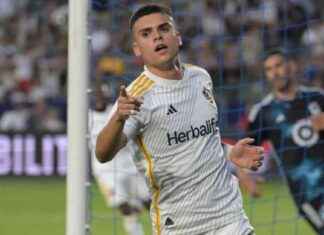FC Schalke 04 uses the winter transfer phase to make numerous corrections to the squad. Six new players are coming, a talent from the U23s gives hope, as does the return of injured top performers. The problem, however, is that the Bundesliga schedule does not mean well.
Around the city of Gelsenkirchen there are construction sites that are so gigantic that you can’t even imagine that they will ever disappear. Affected are the commuters on the A43, who sneak past the Herne junction every day, where the A42 crosses, which leads some of the travelers to the left after just a few kilometers to one of the largest construction sites in German football: FC Schalke 04. There too we’ve been working hard over the past few weeks and there, too, it’s about getting things running properly again. But they didn’t have as much time at Schalke as the workers were given on the cross. The “Deadline Day” on January 31 had severely terminated the construction freeze.
Time for an initial assessment: the clattering giant from the Ruhr region has hired out six specialists for six months. Only competitor FC Augsburg was even more busy on the transfer market with seven newcomers. The temporary workers should help to prevent the second descent GAU within two years. In the remaining 16 rounds in the Bundesliga, there are still 48 points to be digged up and placed in your own lorry. A lot is still possible. In theory. In practice, this is at least a mammoth task for the Gelsenkirchen team. And to discover the mammoth in this task, a simple look at the numbers is enough. After 18 match days there are ten points in the account. There were only two wins and a measly 14 goals. In the second series, Schalke would need the record of a Europa League contender to prevent relegation. That the year started with one out of nine points and a goal difference of 1:9? Oh well.
Schalke have already experienced the opposite case. Almost exactly three years ago, the merciless crash began. After a strong first half of the season under coach David Wagner and a convincing start in the second half of the season, Borussia Mönchengladbach was defeated 2-0, suddenly nothing worked. If the cushion hadn’t been so large, the Royal Blues would have rushed unchecked into the 2nd Bundesliga, which finally happened with a year’s delay. Not a single game was won.
Back to the here and now. Catching up is the keyword. And she should start with the massively rebuilt squad against the opponent who had the last first division hallelujah before the crash. And here, too, the mammoth task can be quickly revealed in the numbers: Schalke have not won away from home in the upper house since November 23, 2019. You are as dangerous as a wolf without teeth. To make the dimension of this series of 36 desperate attempts even clearer: At that time, Corona was still a largely unknown virus in China.
Times change. The pandemic has thundered across the world. The vaccinations have come, the virus has mutated, the masks have fallen. During this time, Schalke has worn out eight coaches and handled a mass of transfers that are otherwise only known quantitatively from Chelsea. This winter, too, the “Blues” threw the Fuffis around like wild ones, but the logic behind the transfers is probably only understood by the initiated. 330 million euros left their own account, while Schalke only transferred a cute 450,000 euros in rental fees (according to transfermarkt.de) to various clubs. But at least with a plan. Adapted to those of Thomas Reis.
He has been the beacon of hope since October last year. Almost the only one. With VfL Bochum he had managed two “miracles” in a row, promotion and relegation. Sport director Peter Knäbel recently emphasized that he should be given time to repeat these things at Schalke. Means: The club would also go into the 2nd division with Reis. Another scenario is preferred: just stay up. And halfway through the season you see yourself in a position to achieve that goal. “We’re competitive now,” says sports director Peter Knäbel, also a remarkable admission that a lot of things went wrong last summer.
With the central defender Moritz Jenz from Celtic Glasgow and the midfielders Éder Balanta (from Bruges) and Niklas Tauer (Mainz), players in the squad were now believed to give more stability with the rattling giant. Winger Tim Skarke (from Union) and striker Michael Frey (Antwerpen) are expected to make the crippling attack more flexible. Knäbel sees all of the newcomers as players “who give us dynamism”. Dynamism, at least in Bochum, that was Reis’ key to the sometimes spectacular style of play. “I’m glad that the squad has changed and that no one can opt out anymore,” the coach admitted on Thursday after the end of the transfer period. “It’s nice that some players have come back. It’s different now. There’s also quality.”
In fact, not only could all six loan players be in the starting eleven against Mönchengladbach, but also three other players in the fast winger and U23 promoted Soichiro Kozuki, playmaker Rodrigo Zalazar and the clearer Alex Král, who had played no role in the first half of the season or for a long time were injured. In addition, Ralf Fährmann is the new number one. Means: almost an entire “new” Elf is available to Reis. The attacking full-back Thomas Ouwejan should also return in the near future. While construction at the Herne motorway junction will continue until 2025, Schalke will have their first material test that evening in Mönchengladbach before the intensive stress tests against VfL Wolfsburg and Union Berlin follow: botched construction or stable foundations?






